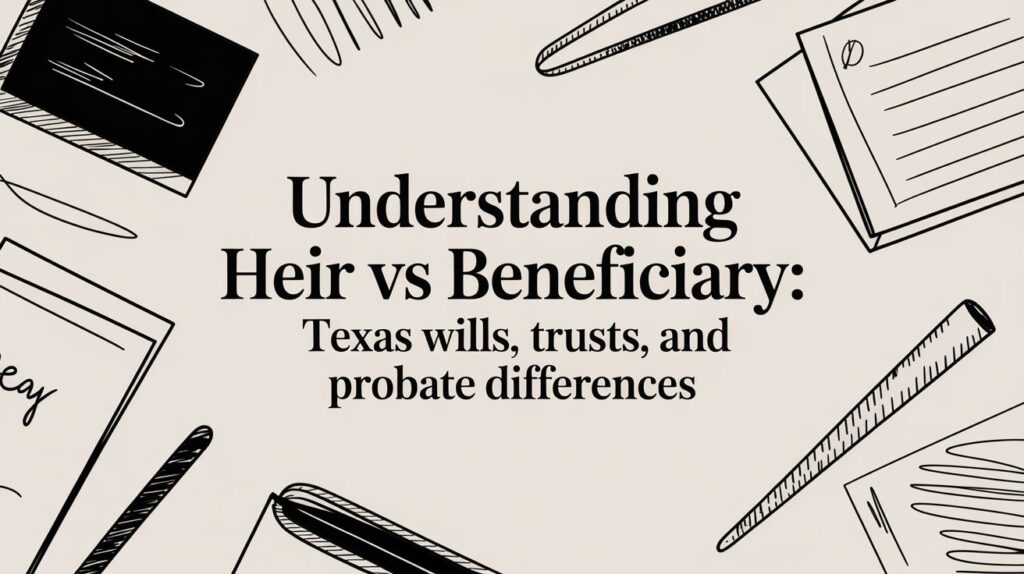When real estate becomes part of a probate estate in Texas, the process of managing and overseeing that property can become complex. During this time, the estate is under the authority of the court, and properties involved may need maintenance, tenant management, or even preparation for sale. This is where the role of a property manager becomes invaluable. Property managers ensure effective handling of probate real estate assets, preserve their value, and minimize potential complications for heirs and beneficiaries. In this article, we’ll explore the specific duties of property managers during Texas probate proceedings, highlight the importance of their involvement, and provide insights into how they help streamline the process for estate executors, families, and attorneys.
Understanding Texas Probate Real Estate
To fully grasp the role of property managers in probate real estate, it’s essential to understand what probate entails. Probate administers a deceased person’s estate, ensuring that the decedent’s assets follow the will or, in the absence of one, state law. Real estate, whether residential, commercial, or vacant land, often forms a significant portion of the estate.

During probate, the executor or administrator safeguards and manages these assets until transferring them to the beneficiaries or selling them. However, handling real estate can be a significant burden, especially when dealing with multiple properties, out-of-state assets, or properties requiring repairs and tenant management. This is where a skilled property manager steps in.
Key Responsibilities of Property Managers in Texas Probate Real Estate
A property manager’s involvement in Texas probate real estate focuses on preserving the value of the property, ensuring compliance with Texas laws, and protecting the interests of the estate. Below are the key responsibilities property managers typically handle in the context of probate.
1. Maintenance and Preservation of the Property
One of the most critical roles a property manager plays is ensuring that the property remains in good condition throughout the probate process. This responsibility includes:
- Routine Maintenance: Property managers handle ongoing maintenance tasks such as lawn care, cleaning, and minor repairs, ensuring that the property doesn’t fall into disrepair while it awaits sale or transfer to beneficiaries.
- Emergency Repairs: If unexpected issues arise, such as plumbing problems, roof leaks, or electrical malfunctions, the property manager coordinates the necessary repairs to prevent further damage.
- Property Security: Vacant properties are often targets for vandalism or trespassing. Property managers can arrange for security measures, such as installing cameras, securing locks, or hiring security personnel, to protect the asset.
This aspect of property management is vital in maintaining or increasing the property’s value, which ultimately benefits the estate’s beneficiaries.
2. Managing Tenants and Leases
In many probate cases, real estate is income-generating through rental agreements. Managing these properties while going through probate requires careful attention to tenant relations and compliance with legal obligations.
- Tenant Communication: Property managers serve as the point of contact for tenants, informing them of any changes in ownership or legal circumstances while maintaining positive relationships to ensure continued tenancy.
- Lease Enforcement: Property managers handle the enforcement of lease terms, such as rent collection and addressing lease violations. They ensure that the terms of the lease are adhered to, which can provide steady income for the estate.
- Vacancies and Tenant Placement: If a tenant moves out during probate, the property manager is responsible for finding new tenants, conducting screenings, and signing new leases. This is crucial in preventing income loss during the probate period.
By managing tenant relations and lease agreements, property managers help minimize disruption to rental income, which is often essential to covering ongoing estate expenses like mortgage payments, taxes, and insurance.
3. Preparing the Property for Sale

In some probate cases, real estate must be sold to pay off debts or to distribute the proceeds to beneficiaries. Property managers play a pivotal role in preparing the property for sale, often working in conjunction with real estate agents and probate attorneys. Their duties may include:
- Staging and Presentation: Property managers ensure that the property is presented in the best possible condition to attract potential buyers. This might involve staging the home, overseeing cleaning and cosmetic improvements, or arranging for landscaping services.
- Coordinating Appraisals and Inspections: Property managers work with appraisers and inspectors to evaluate the property’s market value and condition, which is crucial information for setting an appropriate listing price.
- Handling Property Showings: They can assist in showing the property to prospective buyers, coordinating schedules with real estate agents, and making sure the property is available and presentable at all times.
A well-maintained and well-presented property is more likely to fetch a higher sale price, which is in the best interest of the estate and its beneficiaries.
4. Financial Management and Reporting
Handling the financial aspects of probate real estate can be overwhelming, particularly when there are multiple properties or complex rental agreements involved. Property managers can provide detailed financial oversight, including:
- Rent Collection and Recordkeeping: Ensuring that all rental payments are collected on time and properly documented is a critical part of managing probate real estate. Property managers can provide regular reports to the executor or estate administrator, outlining income and expenses.
- Expense Management: Property managers also handle payment of bills related to the property, such as utilities, property taxes, and insurance premiums. This helps prevent any lapses that could result in penalties or fines.
- Tax Documentation: Property managers assist in preparing financial records for tax purposes, which is especially important when filing final income taxes for the deceased or addressing estate taxes.
Accurate financial management ensures transparency, accountability, and protection of the estate’s value during the probate process.
5. Compliance with Texas Law
Navigating Texas probate laws can be tricky, especially when it comes to managing real estate. Property managers are familiar with local, state, and federal laws governing probate real estate, landlord-tenant relationships, and property transactions. They help ensure that:
- Property Codes and Ordinances Are Followed: Texas enforces specific property codes, covering safety, zoning, and health standards. Property managers ensure compliance with these regulations to avoid legal penalties.
- Tax Obligations Are Met: Property managers keep the estate current with property tax payments. They also prevent tax liens that could complicate the probate process.
- Fair Housing and Tenant Rights Are Observed: Property managers ensure the estate complies with Texas landlord-tenant laws, honor existing lease agreements, and protect tenant rights during the probate process.
Failing to follow the legal requirements related to probate real estate can lead to delays, additional costs, and potential legal disputes, which property managers help to prevent.
Why Executors and Administrators Need Property Managers in Probate
The probate process can be lengthy, sometimes taking months or even years to complete. During this time, real estate properties still require upkeep, management, and financial oversight. Executors and administrators often find it challenging to juggle the many responsibilities of probate while also managing real estate.
Here are key reasons why enlisting a property manager is invaluable to executors and administrators:
- Time-Saving: Probate executors are often family members or close friends of the deceased and may have other personal and professional obligations. A property manager handles the day-to-day tasks, freeing up time for executors to focus on other responsibilities.
- Expertise: Property managers bring a wealth of knowledge in managing real estate, from tenant relations to property maintenance and legal compliance. They manage the property properly.
- Maximizing Value: A property manager helps executors maintain real estate assets, generate income, and prepare them for a successful sale if needed. This ultimately benefits the beneficiaries by preserving and potentially increasing the estate’s value.

Choosing the Right Property Manager for Texas Probate Real Estate
Not all property managers are equipped to handle the unique challenges of probate real estate. When selecting a property manager, it’s important to consider the following:
- Experience with Probate Real Estate: Look for property managers who have experience working with probate estates. They should understand the legal and financial complexities involved in managing estate properties.
- Local Expertise: A property manager with local experience can better navigate Texas’s specific laws and regulations regarding property management.
- Strong Communication Skills: Probate can be a sensitive and emotional process for families. A property manager who communicates effectively and compassionately with all parties involved can help reduce stress and tension during the process.
Why Property Managers Are Essential in Texas Probate Real EstateConclusion: The Indispensable Role of Property Managers in Texas Probate Real Estate
Handling real estate during the probate process is no small task. Property managers play an indispensable role in preserving the value of the estate’s real property assets, managing tenants, and ensuring legal compliance. For executors, administrators, and beneficiaries, having a reliable property manager can simplify the complexities of probate real estate and lead to better financial outcomes. Property managers care for and maintain the estate’s properties during the probate process, giving families peace of mind and allowing them to focus on honoring their loved one’s legacy.








